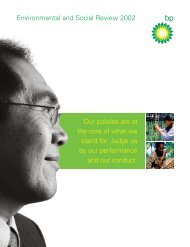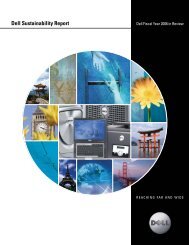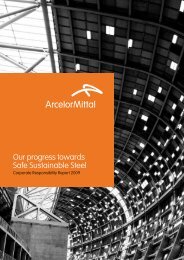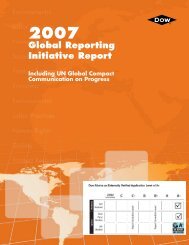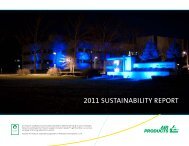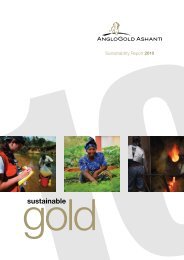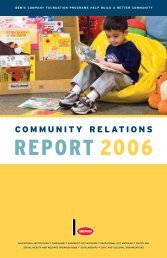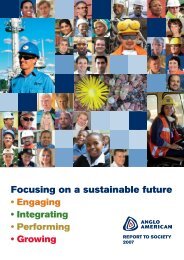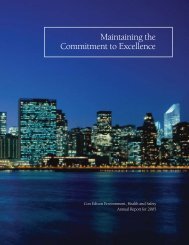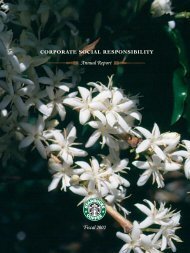Blueprint for Sustainability - Corporate - Ford Motor Company
Blueprint for Sustainability - Corporate - Ford Motor Company
Blueprint for Sustainability - Corporate - Ford Motor Company
- No tags were found...
You also want an ePaper? Increase the reach of your titles
YUMPU automatically turns print PDFs into web optimized ePapers that Google loves.
HUMAN RIGHTS 29Working conditions refers to aspects of human rights inthe workplace, as governed by local laws and affected byinternational standards pertaining to workplace issues suchas child labor, harassment and discrimination, health andsafety, wages and benefits, freedom of association,working hours and <strong>for</strong>ced labor.Human Rights at <strong>Ford</strong><strong>Ford</strong>’s Code of Basic Working Conditions (CBWC) articulates ourcommitments on key human and labor rights issues. In effectsince 2003, it was <strong>for</strong>mally adopted as a Policy Letter in 2007.In early 2008, <strong>Ford</strong> joined the United Nations Global Compact,a framework <strong>for</strong> businesses that are committed to aligning theiroperations and strategies with 10 universally accepted principlesin the areas of human rights, labor, the environment and anticorruption.This action rein<strong>for</strong>ces our commitment tooutstanding per<strong>for</strong>mance and transparency in these areas.Since 2003, we have developed a range of processes to ensurethat our own operations and those of our business partners andsuppliers are adhering to the CBWC in practice. This sectiondescribes key actions we have taken to continue to integratehuman rights into our operations.The 10 principles of the UN Global CompactHuman RightsPrinciple 1: Businesses should support and respect theprotection of internationally proclaimed human rights; andPrinciple 2: make sure that they are not complicit inhuman rights abuses.Labor StandardsPrinciple 3: Businesses should uphold the freedom ofassociation and the effective recognition of the right tocollective bargaining;Principle 4: the elimination of all <strong>for</strong>ms of <strong>for</strong>ced andcompulsory labor;Principle 5: the effective abolition of child labor; andPrinciple 6: the elimination of discrimination in respectof employment and occupation.EnvironmentPrinciple 7: Businesses should support a precautionaryapproach to environmental challenges;Principle 8: undertake initiatives to promote greaterenvironmental responsibility; andPrinciple 9: encourage the development and diffusionof environmentally friendly technologies.Anti-CorruptionPrinciple 10: Businesses should work against corruptionin all its <strong>for</strong>ms, including extortion and bribery.Adoption of Revised Code of Basic Working ConditionsIn 2006, we revised our CBWC to add provisions that we feltwere important to strengthen our ef<strong>for</strong>ts in this area, based onour experience implementing and assessing compliance with theCBWC. Reflecting our increasingly integrated approach tomanaging human rights and community issues, the revisionsarticulated our commitments on several key issues that extendbeyond the fenceline of our facilities and those of our suppliersto include our impacts on the communities in which we operate.Specifically, we added commitments on “communityengagement and indigenous populations,” “bribery andcorruption” and “environment and sustainability.” We also addedexplicit reference to – and our general endorsement of – severalhuman rights frameworks and charters. The revised CBWC wasapproved and <strong>for</strong>mally rolled out to employees and suppliers asPolicy Letter #24 in 2007.Working Conditions in <strong>Ford</strong> PlantsSince 2004, we have conducted 11 <strong>for</strong>mal assessments of <strong>Ford</strong>facilities, four of which were joint-venture facilities.<strong>Ford</strong> Facility Assessments in 2007During 2007, we conducted assessments at our Camaçarifacility in Bahia, Brazil, at our two South African facilities (one a90-percent <strong>Ford</strong>-owned joint venture), and at our sole facility inRussia. These four sites were selected by <strong>Ford</strong>’s SustainableBusiness Strategies and Purchasing Strategy functions basedon the sites’ impact on our supply chain, emerging issues andthe views of thought leaders, NGOs and human rights activists.The findings of the assessments were generally consistent withthose of previous assessments. That is, they confirmed that<strong>Ford</strong>’s wholly and majority-owned facilities are operating incompliance with our CBWC. Reflecting the expanded scope ofthe CBWC, the assessments also discuss and document<strong>Ford</strong> Bridgend, UKINTRODUCTION GOVERNANCE CLIMATE CHANGE MOBILITY HUMAN RIGHTS VEHICLE SAFETY SUSTAINING FORD CONCLUSIONFor more in<strong>for</strong>mation visit:www.<strong>for</strong>d.com/go/sustainability



